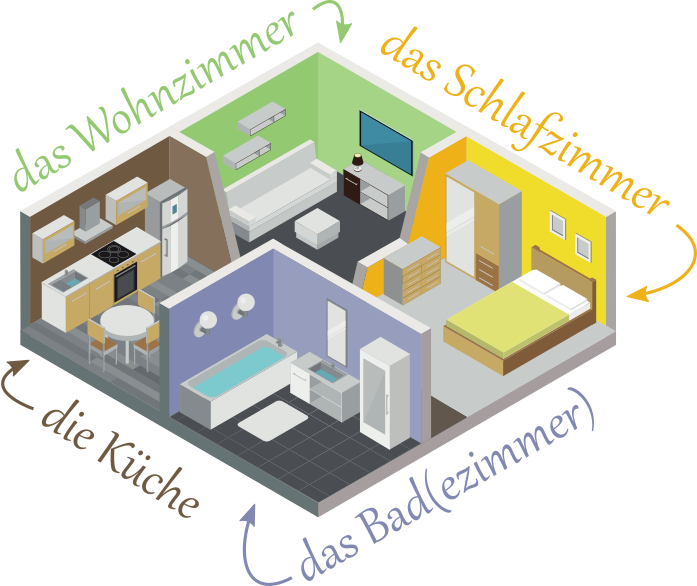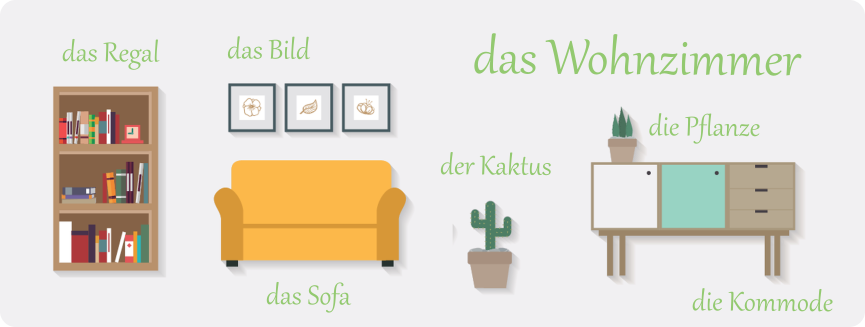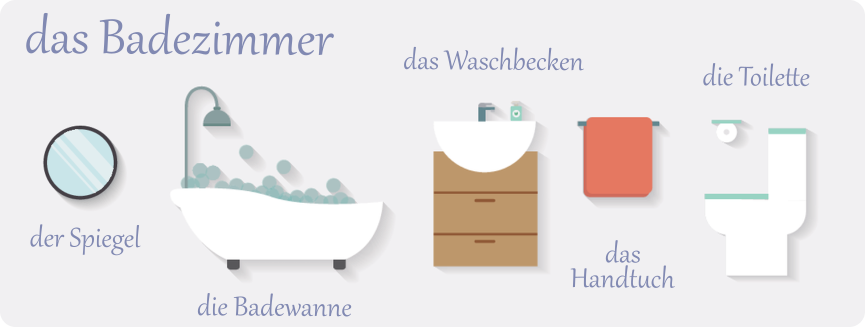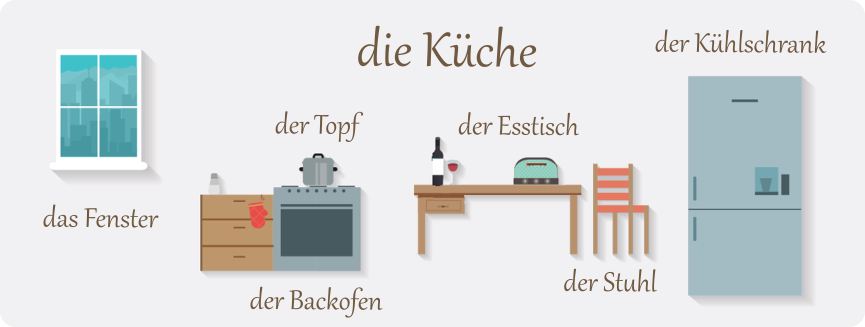In the article series “Grundlagen”, I’ll show you the basics of German. Suitable for beginners (A0-A1). You’ll find exercises at the end of the article.
In this post, I introduce the German articles "der, die, das”. Also, you will learn how to talk about rooms, furniture, and prices.
Artikel: der / die / das…?
Nouns have one of three different genders in the German language: der (male), die (female), or das (neutral)
Often, the grammatical gender of a noun corresponds to the biological gender. This applies mainly to words describing people. Examples: “der Mann”, “die Frau”, “der Polizist”. (Important exception: “das Mädchen”)
However, for most words, you’ll have to memorize the grammatical gender. Even everyday-objects can have a male or female (grammatical) gender! Examples: “der Stuhl”, “die Tasse”, “das Fenster”.
💡 I recommend to always learn the word together with its gender: “the window = das Fenster”!
Zimmer in einem Haus / einer Wohnung
Let’s learn a couple of words for rooms (das Zimmer) in a flat or a house:

Einrichtung und Möbel
Here are some words for furnitue (die Möbel) and objects in your house. Note how the objects can have a male (der), female (die), or neutral article (das).


Preise: Was kostet das?
Let’s pretend you move to Germany and want to buy furniture for your room. How do we ask for the price? You can go with these expressions:
“Was kostet …?” / “Wie viel kostet …?” / “Wie teuer ist …?”
“Der/die/das kostet …€.”
“Das ist teuer!” / “Das ist günstig!”
Finally, how do we say prices in German? If the price consists of Euros and Cents (1/100th of a Euro), then the word “Euro” is placed in-between the two amounts! Let me give you some examples:
120,00€ = “Ein-hundert-zwanzig Euro”
0,99€ = “Neun-und-neunzig Cent”
120,99€ = “Ein-hundert-zwanzig Euro neun-und-neunzig”
120,99€ = “Ein-hundert-zwanzig Euro und neun-und-neunzig Cent” (super official way of speaking)
❗ Be aware that the currency “Euro” is pronounced like “Oiro” in German.
Dialog
Let’s look at the dialogue to see what we learned about articles, furniture, and prices:
Lisa: “Wie viel kostet der Schrank?”
Timo: “Der kostet 83,45€.”
Lisa: “Das ist günstig! Und wie viel kostet die Lampe?”
Timo: “Die kostet 345,89€.”
Lisa: “Das ist teuer!”🎧 Audio-version of the dialogue: slow and fast.
Hausaufgabe 🖊
It’s your turn! The exercise can help you understand and remember the new expressions. Feel free to share your answers in our facebook group, where we check your text and discuss! 💬
Exercise: You just moved to Germany, and need to equip your kitchen. Pick one or two items, and write a dialogue to ask for its price!
You: "Was kostet der Topf?"
Tom: ...
That’s it for today. If you liked this newsletter, subscribe to get new articles straight to your email inbox. See you next time,
Rebecca 👋
About me 👩🏫
I am Rebecca, an enthusiastic language coach since 2016. I love learning languages, and help other people learn them! As a Duolingo Global Ambassador, I regularly host online-events for German, currently exclusively online. I’m also available as private tutor via preply.
Community 🌍
Stay up to date about the events in my facebook-group! This is also the right place for questions and answers about the German language!
Newsletter 💌
With this newsletter, I want to offer material and ideas to everyone who is in the process of learning German. It will contain explanations of grammar and vocabulary, but also information about German culture and proverbs. For advanced topics, I’ll write the newsletter in German, so you can exercise reading German texts. I hope to publish at least once a week.



